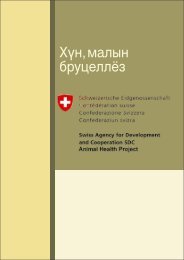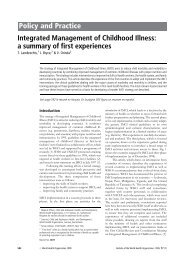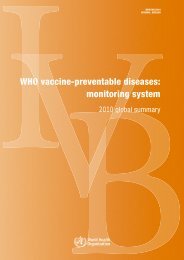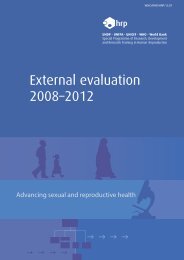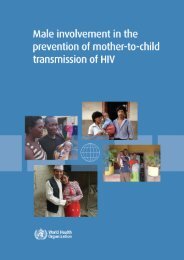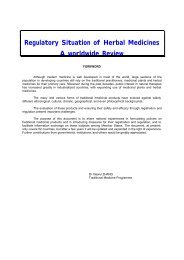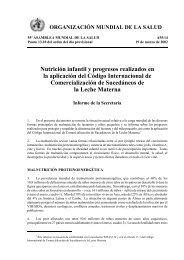IPDE - Extranet Systems - World Health Organization
IPDE - Extranet Systems - World Health Organization
IPDE - Extranet Systems - World Health Organization
Create successful ePaper yourself
Turn your PDF publications into a flip-book with our unique Google optimized e-Paper software.
54 A. A. Dahl and A. Andreoli<br />
which may not be valid elsewhere. This criticism was not widespread, and<br />
ultimately the <strong>IPDE</strong> proved relevant across cultural and social settings.<br />
Some investigators noted some problems of applicability. A few mentioned,<br />
e.g., that questions concerning reckless driving, and physical<br />
abuse of family members were problematic in their culture. Some high<br />
school education was probability necessary for an adequate understanding<br />
of the <strong>IPDE</strong> questions. And in some counvies the high rate of longterm<br />
unemployment made the questions related to work experience less<br />
meaningful.<br />
The following quotes illustrate experiences with the <strong>IPDE</strong> in different<br />
cultures:<br />
The pattern of occurrence of personality disorders is largely unexplored in the Indian context, and<br />
the <strong>IPDE</strong> may usher in empirical investigation into this area.<br />
Overall I am finding few problems of applicability of the <strong>IPDE</strong> to our culture of interest. Our subjects<br />
an mostly American urbanites who reside near the birthplace of the DSM-III-R itself.<br />
Therefore, one might expect that our subjects would share values and perspectives similar to those<br />
exemplified by the <strong>IPDE</strong>. This seems to be the case.<br />
Respondents who were not psychologically-minded had great difficulty with borderline questions<br />
about identity. Although patients suffering from mental subnormality were excluded, those<br />
respondents whose intelligence appeared to be at the lower end of normal had considerable difficulty<br />
with these concepts. In contrast, subjects from middle-class backgrounds pedormed much<br />
more satisfactorily.<br />
In French culture, people often answer not with specific examples, but more in tenns of: 'I feel<br />
this way.'<br />
It is my impression that the <strong>IPDE</strong> asks for a kind of psychological-mindedness or self-reflection<br />
which is often not found in Holland. I also think that the place of leisure activities and social relations<br />
compared to work is somewhat different in our culture, which could lead to an overdiagnosis<br />
of obsessive-compulsive personality disorder.<br />
If there is need to shorten the interview, please indicate the sections<br />
that can be omitted.<br />
All centres reported that the <strong>IPDE</strong> took a long time to administer, and the<br />
instrument can be shortened if only one of the two diagnostic systems is<br />
used. If only certain PDs need to be evaluated, it can also be shortened,<br />
but all PDs have to be examined to get complete differential diagnostic<br />
coverage. Several centres reported that they had not found any cases of<br />
DSM-III-R sadistic PD. and that the questions for that diagnosis could be<br />
omitted. It should be noted that in DSM-IV, sadistic, self-defeating, and






